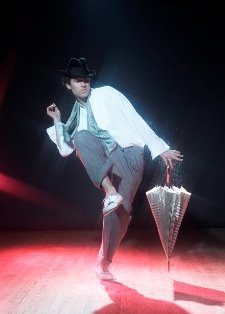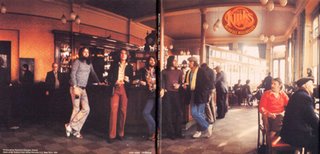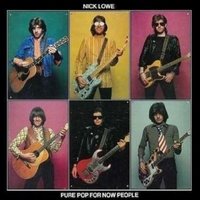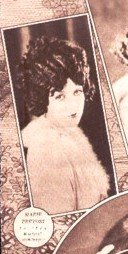
This summer, when I wasn't reading Cormac McCarthy novels, I was flipping through LPs in the musty records shops of upstate New York. What happened is I started dreaming up a soundtrack for some amalgamated film interpretation of
Blood Meridian,
All the Pretty Horses,
The Crossing and
No Country For Old Men. The only real guiding thoughts were border-themed imagery, maybe some laconic, slow-drip mood music for the image of a horsebacked rider slumped on a blood-red horizon, crushed by the existential largeness of the sky, appearing and disappearing in the heat vapors. Tejas. Guns. Death. Blood oaths. Long, hot, empty travel and wandering weirdos in burnt-out adobe villages. And, of course, Mexico. As time went on, I developed more liberal interpretations of what exactly this Cormac-inspired film might be and what music I could use for it. You could consider them suggested tunes for whatever the Coen Brothers might be cooking up for
No Country for Old Men. Or perhaps we play them like mini-music videos over lush and dramatic static shots between scenes, a la Lars Von Trier's
Breaking the Waves.
For starters, I like the idea of coopting the theme music from a previous Western soundtrack. Cormac lifts Faulkner, we lift Sam Peckinpah's
Pat Garrett & Billy the Kid. The tambourine gives us the opening shot of distant spurs on a widescreen desert.
Main Theme (Billy) - Bob DylanThis is where our rangy 16-year-old protagonist is leaving his home in Tennessee, setting out on his Mexico quest. What's both great and stupid about Charlie Daniels is encapsulated in this line:
We were both so happy just being together, like a possum in the woods. Think about that. "We" were a "possum." And, of course, a "possum in the woods" is "happy being together." Huh? (Wait, maybe he's the "possum" and she's the "woods"? Ew.)
Franklin Limestone - Charlie Daniels BandOur protaganist--I like Billy Parham, from
The Crossing--is already getting homesick. So he remembers his favorite Elton John song. Except, he hears it in his head as Rod Stewart. And Ron Wood starts singing this limey-sounding harmony at minute 2:38. Also, for some reason, it sounds like it was recorded on a wax cylinder. Maybe it's the heat.
"Country Comforts" - Rod StewartAfter a few days, he's out on the long, hot plains, heading across "Tejas," the name of this ZZ Top album, circa '76. What I love about this is the sloooow, tear-drop slide solo over the frantic riffage that just kind of gets at something true about Texas: mellow and easy on top, speed-freaky and fucked up under neath.
"Pan Am Highway Blues" - ZZ Top The synth riff on this B.W. Stevenson song is shocking and misguided in many ways, but it's also perfect for when Billy finds himself in a funky 80s music-video-style retro-futuristic Star Wars cantina scene that our pomo director has conjured up. Kind of like Sophia Coppola using 80s New Wave music for a movie about
Marie Antoinette. I love the line,
I'll be down at the station sipping coffee at the book rack. The back of the "Lost Feeling" LP shows the pages of Shakespeare's "Twelfth Night," with a pocket watch lying on them. Like G.W., perhaps fellow Texan B.W. had recently read some
"Shakespeares.""Down to the Station" - B.W. StevensonRick Danko. He's kind of what you become at the end of a McCarthy novel: all burnt out from killing and drinking, having spent too many long, freezing nights by a desert fire with some creepy ex-priest speaking in tongues while poking the embers under the stars. This is from his 1977 solo album. Danko decided to spell "New Mexicoe" with an E. I guess that's the mescalin talking (or spelling).
"New Mexicoe" - Rick DankoI used to listen to the Cowboy Junkies "WHITES OFF EARTH NOW!!" back in high school, so I was delighted to find the album again this summer. (Remember when everyone in college hated white people?) Here, Billy is extremely paranoid that some corrupt Mexican coppers are on his trail. Having crossed the border, he just saved a young Mexican girl from some violent manhandling and now he's trying to escape with her into the darkness by being real. Real. Quiet. Listen. (Yeah, I know it's a Springsteen song, but don't think about New Jersey.)
"State Trooper" - Cowboy JunkiesBilly's repressed romantic feelings are intimated but never articulated. He's too laconic and gentlemanly for that. The next day, he drops the young Mexican girl off in an encampment of wash women, where he eats some beans on tortillas before heading out. He says some kind words to her in Spanish and rides into the valley, south and west.
"Baby Please Don't Go" - Cowboy JunkiesThis next song plays immediately after a hideous, ultraviolent murder scene in which Billy has witnessed 19 Comanches get scalped and an unfortunate Mexican railroad worker get his eyeballs sucked out by a psychotic Civil War soldier gone AWOL. Now the band of mercenary killers wants to party. Imagine this song playing over slo-mo images of scary-ass dudes shooting guns in the air and puking. You only use Nick Lowe for irony.
"Tonight" - Nick LoweAfter a few more days on the desert, our Billy meets another white man (who hasn't yet left the earth). Dude named Filbert. He's headed down to get a divorce from his shrewish wife, who is on
his trail. He sings a song by firelight and the shadows flicker around his pocked cheeks (he looks vaguely like Burt Bacharach). A little comic relief.
"Mexican Divorce" - Ry CooderA month later, our hero/anti-hero comes across a caravan of freaks and meets another woman, a fishnet-clad circus performer from Juarez who's down on her luck and suggests they tie one on with a jug of Mexican wine. "Live a little, buddy," she says. In Spanish.
"Sip the Wine" - Rick Danko I've already posted this last song before, but I need it for the movie. Billy is feeling the existential dread of being so long alone and in such a grim land of drifters, killers, lost souls, goons, carnival geeks and whores. After a bunch of really grim, tragic shit has happened--Filbert got his assed handed to him by a band of Apache--Billy has seen too much. He's gone to the ends of the earth looking for solace in a cruel world, ever wondering what happened to that Mexican gal, who came back to nurse him back to health during a long fever dream after he was shot in the stomach by the corrupt sheriff (then she ran off with Rick Danko). He also had to kill the ex-priest, who had tried to scalp him for some ransom money for horses Billy stole that originally belonged to his dad back in Franklin Limestone. Now he's back on his horse. Alone. The sky is crushing his tiny, heat-exhausted figure on a widescreen desert. The credits roll. Cue Bonnie Raitt.
"Too Long at the Fair" - Bonnie RaittFIN
 Remember back in the ‘90s when chessmaster Gary Kasparov tied with the IBM monster chess computer Big Blue in a series of high-profile matches? I read an interview with Kasparov in which he explained his approach to stumping the super machine. Since Big Blue could map out some ridiculously huge number of possible future moves and scenario, Kasparov concluded that only way he could beat the supercomputer was to inject some nonsensical noise into his playing. He messed with Big Blue’s silicon mind by randomly doing a few moves that made no sense.
Remember back in the ‘90s when chessmaster Gary Kasparov tied with the IBM monster chess computer Big Blue in a series of high-profile matches? I read an interview with Kasparov in which he explained his approach to stumping the super machine. Since Big Blue could map out some ridiculously huge number of possible future moves and scenario, Kasparov concluded that only way he could beat the supercomputer was to inject some nonsensical noise into his playing. He messed with Big Blue’s silicon mind by randomly doing a few moves that made no sense.




